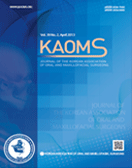Journal of the Korean Association of Oral and Maxillofacial Surgeons
- P-ISSN2234-7550
- E-ISSN2234-5930
- SCOPUS, KCI, ESCI
 ISSN : 2234-7550
ISSN : 2234-7550
A comparative study of quality of life of patients with maxillofacial fracture and healthy controls at two tertiary healthcare institutions
Adekunle Moses Adetayo (Babcock University, Ilisan-Remo, Nigeria)
Wasiu Lanre Adeyemo (Lagos University Teaching Hospital)
Akinola Ladipo Ladeinde (Lagos University Teaching Hospital)
Micah Olalekan Gbotolorun (Lagos University Teaching Hospital)
Abstract
Objectives: Despite treatment, the pre-traumatic facial appearance of patients with maxillofacial fractures might not be able to be restored, and this difference can affect the person’s quality of life (QoL). This study was designed to evaluate changes in QoL of people with maxillofacial fractures. Materials and Methods: The study population was comprised of participants with maxillofacial fracture and age- and sex-matched healthy controls without history of such fracture. QoL was measured using the World Health Organization Quality of Life BREF (WHOQOL-BREF) questionnaire, which was administered to the patients before treatment (Time 1), at 6 weeks post-treatment (Time 2), and at 12 weeks postoperatively (Time 3). The values were compared with those of healthy controls. The QoL was compared between closed reduction group and open reduction and internal fixation group. Results: The QoL scores of people with maxillofacial fracture before treatment were significantly lower (P=0.001) than those of healthy controls in all domains of the WHOQOL-BREF. The QoL scores in the psychological and social domains of patients with maxillofacial fracture at Time 3 were still lower than those of healthy controls (P=0.001). Conclusion: The QoL of patients with maxillofacial fracture was significantly reduced before treatment in all domains and remained reduced in both psychological and social domains weeks after treatment. Therefore, clinicians must be aware of and manage the residual psychosocial issues that can accompany the post-treatment period of maxillofacial injury.
- keywords
- Bone fractures, Fixation, Quality of life
- Downloaded
- Viewed
- 0KCI Citations
- 0WOS Citations